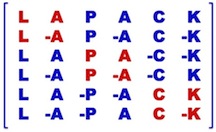 |
LAPACK 3.3.1
Linear Algebra PACKage
|
 |
LAPACK 3.3.1
Linear Algebra PACKage
|
00001 SUBROUTINE DSTECH( N, A, B, EIG, TOL, WORK, INFO ) 00002 * 00003 * -- LAPACK test routine (version 3.1) -- 00004 * Univ. of Tennessee, Univ. of California Berkeley and NAG Ltd.. 00005 * November 2006 00006 * 00007 * .. Scalar Arguments .. 00008 INTEGER INFO, N 00009 DOUBLE PRECISION TOL 00010 * .. 00011 * .. Array Arguments .. 00012 DOUBLE PRECISION A( * ), B( * ), EIG( * ), WORK( * ) 00013 * .. 00014 * 00015 * Purpose 00016 * ======= 00017 * 00018 * Let T be the tridiagonal matrix with diagonal entries A(1) ,..., 00019 * A(N) and offdiagonal entries B(1) ,..., B(N-1)). DSTECH checks to 00020 * see if EIG(1) ,..., EIG(N) are indeed accurate eigenvalues of T. 00021 * It does this by expanding each EIG(I) into an interval 00022 * [SVD(I) - EPS, SVD(I) + EPS], merging overlapping intervals if 00023 * any, and using Sturm sequences to count and verify whether each 00024 * resulting interval has the correct number of eigenvalues (using 00025 * DSTECT). Here EPS = TOL*MAZHEPS*MAXEIG, where MACHEPS is the 00026 * machine precision and MAXEIG is the absolute value of the largest 00027 * eigenvalue. If each interval contains the correct number of 00028 * eigenvalues, INFO = 0 is returned, otherwise INFO is the index of 00029 * the first eigenvalue in the first bad interval. 00030 * 00031 * Arguments 00032 * ========= 00033 * 00034 * N (input) INTEGER 00035 * The dimension of the tridiagonal matrix T. 00036 * 00037 * A (input) DOUBLE PRECISION array, dimension (N) 00038 * The diagonal entries of the tridiagonal matrix T. 00039 * 00040 * B (input) DOUBLE PRECISION array, dimension (N-1) 00041 * The offdiagonal entries of the tridiagonal matrix T. 00042 * 00043 * EIG (input) DOUBLE PRECISION array, dimension (N) 00044 * The purported eigenvalues to be checked. 00045 * 00046 * TOL (input) DOUBLE PRECISION 00047 * Error tolerance for checking, a multiple of the 00048 * machine precision. 00049 * 00050 * WORK (workspace) DOUBLE PRECISION array, dimension (N) 00051 * 00052 * INFO (output) INTEGER 00053 * 0 if the eigenvalues are all correct (to within 00054 * 1 +- TOL*MAZHEPS*MAXEIG) 00055 * >0 if the interval containing the INFO-th eigenvalue 00056 * contains the incorrect number of eigenvalues. 00057 * 00058 * ===================================================================== 00059 * 00060 * .. Parameters .. 00061 DOUBLE PRECISION ZERO 00062 PARAMETER ( ZERO = 0.0D0 ) 00063 * .. 00064 * .. Local Scalars .. 00065 INTEGER BPNT, COUNT, I, ISUB, J, NUML, NUMU, TPNT 00066 DOUBLE PRECISION EMIN, EPS, LOWER, MX, TUPPR, UNFLEP, UPPER 00067 * .. 00068 * .. External Functions .. 00069 DOUBLE PRECISION DLAMCH 00070 EXTERNAL DLAMCH 00071 * .. 00072 * .. External Subroutines .. 00073 EXTERNAL DSTECT 00074 * .. 00075 * .. Intrinsic Functions .. 00076 INTRINSIC ABS, MAX 00077 * .. 00078 * .. Executable Statements .. 00079 * 00080 * Check input parameters 00081 * 00082 INFO = 0 00083 IF( N.EQ.0 ) 00084 $ RETURN 00085 IF( N.LT.0 ) THEN 00086 INFO = -1 00087 RETURN 00088 END IF 00089 IF( TOL.LT.ZERO ) THEN 00090 INFO = -5 00091 RETURN 00092 END IF 00093 * 00094 * Get machine constants 00095 * 00096 EPS = DLAMCH( 'Epsilon' )*DLAMCH( 'Base' ) 00097 UNFLEP = DLAMCH( 'Safe minimum' ) / EPS 00098 EPS = TOL*EPS 00099 * 00100 * Compute maximum absolute eigenvalue, error tolerance 00101 * 00102 MX = ABS( EIG( 1 ) ) 00103 DO 10 I = 2, N 00104 MX = MAX( MX, ABS( EIG( I ) ) ) 00105 10 CONTINUE 00106 EPS = MAX( EPS*MX, UNFLEP ) 00107 * 00108 * Sort eigenvalues from EIG into WORK 00109 * 00110 DO 20 I = 1, N 00111 WORK( I ) = EIG( I ) 00112 20 CONTINUE 00113 DO 40 I = 1, N - 1 00114 ISUB = 1 00115 EMIN = WORK( 1 ) 00116 DO 30 J = 2, N + 1 - I 00117 IF( WORK( J ).LT.EMIN ) THEN 00118 ISUB = J 00119 EMIN = WORK( J ) 00120 END IF 00121 30 CONTINUE 00122 IF( ISUB.NE.N+1-I ) THEN 00123 WORK( ISUB ) = WORK( N+1-I ) 00124 WORK( N+1-I ) = EMIN 00125 END IF 00126 40 CONTINUE 00127 * 00128 * TPNT points to singular value at right endpoint of interval 00129 * BPNT points to singular value at left endpoint of interval 00130 * 00131 TPNT = 1 00132 BPNT = 1 00133 * 00134 * Begin loop over all intervals 00135 * 00136 50 CONTINUE 00137 UPPER = WORK( TPNT ) + EPS 00138 LOWER = WORK( BPNT ) - EPS 00139 * 00140 * Begin loop merging overlapping intervals 00141 * 00142 60 CONTINUE 00143 IF( BPNT.EQ.N ) 00144 $ GO TO 70 00145 TUPPR = WORK( BPNT+1 ) + EPS 00146 IF( TUPPR.LT.LOWER ) 00147 $ GO TO 70 00148 * 00149 * Merge 00150 * 00151 BPNT = BPNT + 1 00152 LOWER = WORK( BPNT ) - EPS 00153 GO TO 60 00154 70 CONTINUE 00155 * 00156 * Count singular values in interval [ LOWER, UPPER ] 00157 * 00158 CALL DSTECT( N, A, B, LOWER, NUML ) 00159 CALL DSTECT( N, A, B, UPPER, NUMU ) 00160 COUNT = NUMU - NUML 00161 IF( COUNT.NE.BPNT-TPNT+1 ) THEN 00162 * 00163 * Wrong number of singular values in interval 00164 * 00165 INFO = TPNT 00166 GO TO 80 00167 END IF 00168 TPNT = BPNT + 1 00169 BPNT = TPNT 00170 IF( TPNT.LE.N ) 00171 $ GO TO 50 00172 80 CONTINUE 00173 RETURN 00174 * 00175 * End of DSTECH 00176 * 00177 END